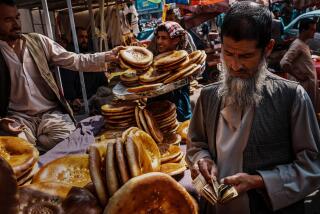Afghan President-to-Be Vows to Persevere in War on Terror
- Share via
KABUL, Afghanistan — Incoming President Hamid Karzai vowed Friday to seat a multiethnic government that reflects the diversity of this nation and pledged to carry on with the U.S.-led war against terrorism until those who “hurt mankind” are defeated.
A day after being overwhelmingly chosen by a grand assembly as Afghanistan’s transitional head of state, Karzai praised his fellow citizens for putting on “a real show of democracy” with the gathering, which is charting the nation’s escape from 23 years of war and isolation.
His confidence about the future in the face of widespread poverty, distrust and anger appeared an attempt to infuse Afghans with hope that their vulnerability to warlords and corruption will end soon now that his leadership has the legitimacy of popular, if indirect, endorsement.
Karzai, who has been interim prime minister for the last six months, will assume the presidency in August.
The 44-year-old nobleman called on the allies who have pledged $4.5 billion in reconstruction assistance to come through with the money so his people can see a tangible reward for renouncing bloodshed.
“Our objective is to take Afghans to a better life, out of this quagmire of 23 years, a quagmire of warlordism, terrorism and hunger,” Karzai told a news conference in the presidential palace.
Most of all, he said, “our people want dignity.”
International aid officials have estimated that it will cost $15 billion to repair the war-ravaged infrastructure of the country. Karzai complained that even the assistance already pledged has been slow to arrive.
“The level of aid received is minimal in comparison to the level of aid promised, and I want to go back to the international community
Clad in the traditional black turban and tunic of ethnic Pushtuns, Karzai swept through a day of public appearances, congratulatory receptions and media meetings to outline his plans for recovery and reconciliation.
Although he has been credited with keeping a lid on ethnic tensions during his term as interim prime minister, his Cabinet--dominated by minority Tajiks and Uzbeks--has been widely criticized for its ties with the Northern Alliance. The warrior-ministers for foreign affairs, defense and the interior came from the ranks of those who inflicted extensive suffering and sometimes committed atrocities during more than two decades of strife, though the forces also are recognized as having helped liberate the country last fall from the repressive Taliban regime.
Karzai declined to give specifics of the new slate of government ministers he would like to see appointed and was vague about whether the more than 1,500 delegates to the grand assembly, or loya jirga, would have a say in the key selections.
“The government will be representative,” he said. “It has to be. It has to represent the Afghan interests as a whole.”
A top priority for his administration, he said, will be reestablishing trade links among the country’s widely separated regional centers.
“We need to have roads for the people so they can communicate and do business,” he said in ticking off the specifics he wants to see in spending the promised foreign aid.
He also denounced corruption as a dispiriting scourge of a suffering nation and vowed that “this menace must go away.”
The president-to-be--who apparently plans no formal inauguration, as he proclaimed himself already serving as head of state--was asked about his outlook on the delicate issue of balancing justice and national reconciliation. He made clear that those guilty of widespread human rights violations will be held accountable. But he also said that preserving peace has to be a higher priority.
“We might have to have first peace and stability and a strong Afghanistan and then give the people of Afghanistan the justice they want,” Karzai told journalists. “Do we have the luxury of having both together? If we do, that’s great. Let’s see.”
The fight against Al Qaeda and other terrorist remnants in his country will be a priority, he said.
“This fight will go on in the same strong manner as we were doing in the past six months and against all those people who are up there to hurt mankind,” Karzai said, promising vigilance “until they are absolutely ... finished.”
While Karzai was disseminating his message to the world’s media, the loya jirga delegates went on with their lively debate, which was expected to continue through the weekend. After being silenced and sidelined for so many years under the Taliban and under the Soviet occupation before it, Afghans have been relishing their opportunities to address the assembly, denouncing their nation’s ills and proposing improvements.
The convocation succeeded in getting the name of the new leadership changed to reflect the Muslim population. It will be known as the Transitional Islamic Government of Afghanistan, although proposals to invoke Islamic Sharia law fell short of passage.
The delegate who nominated Karzai a day earlier urged him to remain humble and in touch with the people. Sheh Mohammed Asef Mohsani suggested that the president-to-be eat only dry bread one day each week.
“You must feel the hunger of the poor,” he said.
More to Read
Sign up for Essential California
The most important California stories and recommendations in your inbox every morning.
You may occasionally receive promotional content from the Los Angeles Times.











